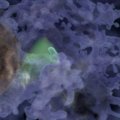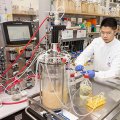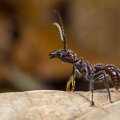The University of Queensland, in association with the UQ Confucius Institute, today hosted a forum on Queensland-China partnerships in research and innovation.
The UQ forum at Brisbane Customs House focused on challenges and opportunities in developments in science and technology.
Guests included representatives from the Queensland government, other Queensland universities and the local business community.
UQ Deputy Vice-Chancellor (International) Dr Anna Ciccarelli said the forum focused on the relationships built between Australia and China, and in particular, the Queensland/Chinese Academy of Sciences connection.
“UQ is delighted to have hosted this forum as it reflects and celebrates the strength of the research relationships between Queensland and China,” she said.
Guest speakers included Professor Bai Chunli, who is President of the Chinese Academy of Sciences, and the Hon. Ros Bates MP, Queensland Minister for Science, Information Technology, Innovation and the Arts.
Professor Bai is a world-renowned scientist, and in 2010 was awarded an honorary UQ Doctor of Science in recognition of his distinguished career and significant achievement in the fields of scanning probe microscopy and nanotechnology, and his major contribution to UQ.
He is a member of the scientific and commercialisation committee of UQ’s Australian Institute of Bioengineering and Nanotechnology and tomorrow is a keynote speaker at the First International BioNano Innovation Conference organised by the AIBN.
Ms Bates has held the Gold Coast electorate of Mudgeeraba since 2009 and was appointed to the Queensland Cabinet in 2012. She is a successful businesswoman with a 30-year career in health and government.
Professor Bai and Minister Bates announced the winners of the Queensland-Chinese Academy of Sciences Biotechnology Projects Fund for 2012.
The Q-CAS Biotechnology awards are a joint initiative between the Queensland Government and the Chinese Academy of Sciences.
The University of Queensland and Guangzhou Institutes of Biomedicine and Health received a $250,000 award each for the project “An Induced Pluripotent Stem Cells Model for Amyotrophic Lateral Sclerosis” (accepted by the Chief Investigator-Queensland Professor Chen Chen of the UQ School of Biomedical Sciences and the Chief Investigator-CAS Professor Miguel Esteban of the Guangzhou Institutes of Biomedicine and Health, CAS).
Other Queensland-based project partners are Associate Professor Pam McCombe of the School of Medicine at the Royal Brisbane & Women’s Hospital; Dr Robyn Wallace at the Queensland Brain Institute; and Dr Shyuan Ngo at the UQ School of Biomedical Sciences.)
The collaborative project will tackle Amyotrophic lateral sclerosis (ALS), a devastating disease that causes progressive degeneration of the motor neurons.
(Motor neurons are nerve cells in the central nervous system that directly or indirectly control muscles.
ALS — sometimes called Lou Gehrig’s disease in the U.S. — has symptoms including weakness, muscle atrophy and spasticity, difficulty in speaking, breathing and swallowing.
Professor Chen said a significant proportion of the cases ran in families, and therefore the disease could theoretically be diagnosed and treated before it fully developed.
“Yet, to date, there are no effective treatments, and this is due in part to the insufficient understanding of the pathogenic mechanisms in different stages of the disease. A long-term goal is to use this technique in the clinic to treat ALS patients,” he said.
Media: Jan King 0413 601 248.
.jpg)










